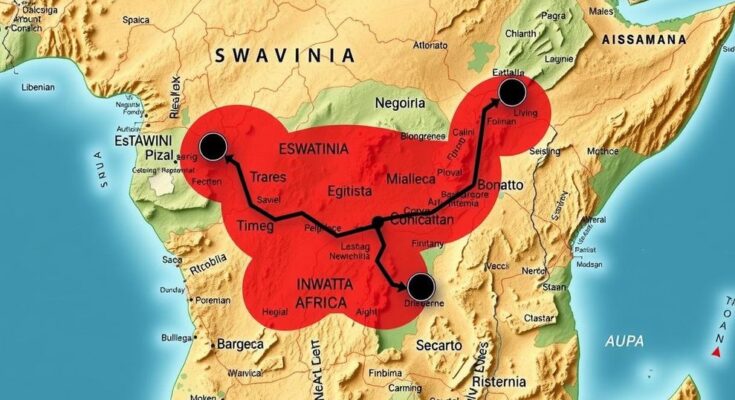Mozambique’s political crisis post-election has led to violence, forcing trade and travel to shift to Eswatini’s Mananga Border Post. Authorities are struggling to maintain order. Efforts for dialogue are emerging, with regional players seeking peace as concerns rise over potential destabilization in Southern Africa.
As Mozambique faces a political crisis following its contentious national election and subsequent unrest, the southern border with South Africa has become increasingly unstable, negatively impacting trade and travel. The violence has necessitated the rerouting of these activities from South Africa’s Leebombo Border Post to the Mananga Border Post in Eswatini, which has emerged as a crucial passage for individuals seeking to cross from Mozambique.
Michael Masiapato, the commissioner of South Africa’s Border Management Authority, remarked that although the authorities are attempting to manage the situation, significant challenges remain. He noted, “Even … when they deploy the military and when they deploy police officers on the corridor [between the capital, Maputo, and the border], it is not able to cover each and every area.” He described the protests as both sporadic and widespread, reflecting the ongoing turmoil that has escalated amid the aftermath of the controversial election of presidential candidate Daniel Chapo.
The international community is closely monitoring the situation, as analysts warn that persistent political violence threatens not only regional security but also economic growth. Solomon Mondlane, a political analyst from Mozambique, expressed cautious optimism regarding the increased diplomatic efforts from both South Africa and European nations aimed at fostering dialogue. He stated, “The good news is we’re hearing more calls from different countries … calling for more dialogue.”
Levy Ndou, a political analyst at Tshwane University of Technology, echoed this sentiment, noting that regional initiatives aimed at dialogue represent positive signs of a collective desire for peace. He suggested that if the chaos escalates, intervention from the Southern African Development Community (SADC) may be essential to restore stability. Zimbabwean President Emmerson Mnangagwa, currently the SADC chair, has asserted that the regional organization is prepared to extend assistance to Mozambique in navigating these challenges.
The current crisis in Mozambique has erupted following a disputed national election that resulted in significant civil unrest and loss of life. As the protests became increasingly violent, it compelled both trade and travel to shift from the traditional Leebombo Border Post in South Africa to Eswatini’s Mananga Border Post. The evolving situation has raised alarms among regional analysts, who fear that if left unaddressed, it could lead to greater instability and economic decline in the region. Political leaders from surrounding countries are now contemplating measures to facilitate dialogue in an effort to diffuse tensions.
In conclusion, the ongoing political turmoil in Mozambique, exacerbated by the recent elections, has led to significant disturbances at the southern border with South Africa. The diversion of trade and travel routes reveals the extent of the crisis, prompting regional calls for dialogue and action. As political analysts and local governments engage in discussions, there is hope for a peaceful resolution to restore stability, emphasizing the importance of diplomatic efforts by surrounding nations.
Original Source: www.voanews.com




